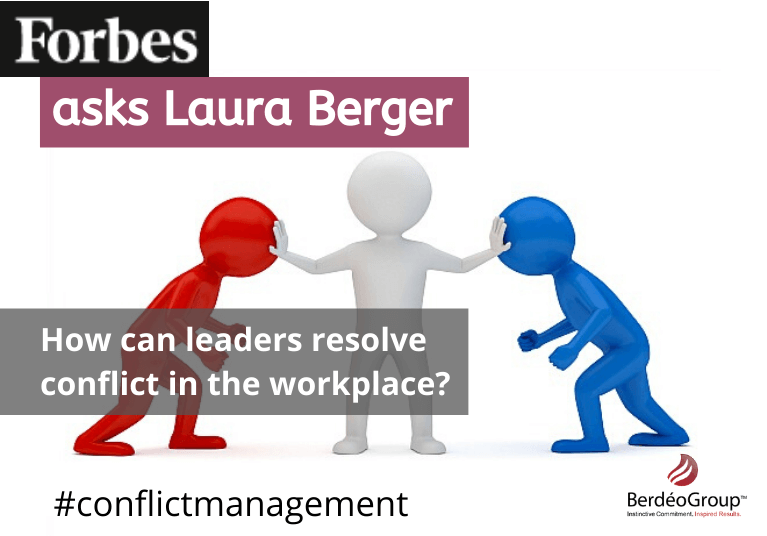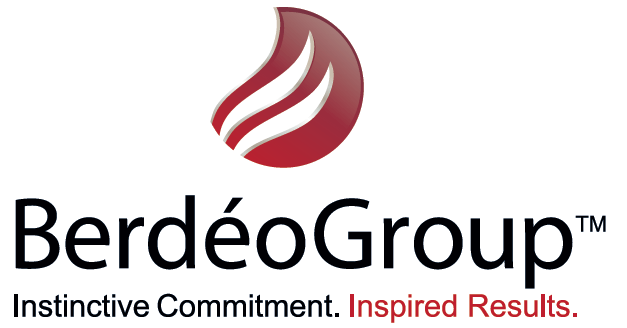Laura’s Success Tips in Forbes
Forbes regularly asks Laura, a Forbes Coaches Council member, poignant questions to enhance the success of its readers.

No leader can be present all the time, and sometimes important business will require they be elsewhere. To ensure things run smoothly while they’re gone, what’s one vital step leaders need to take beforehand? Why?
The benefits of empowerment in leadership are profound. Empowered direct reports feel trusted and engaged. Empowerment organically creates a succession plan and fosters scale for growth. Finally, empowerment creates a well-oiled machine that doesn’t require a leader’s perpetual presence. It is difficult to let go, but doing so will help in countless ways.

Mentoring For The First Time? 14 Tips To Start Off On The Right Foot
Get Excited. People like to feel good. Charge yourself up with great memories or music before the interaction. Then imagine you are “throwing” positivity at your mentee. Emotion rubs off, and they will remember you for it.
From Forbes article: “Mentoring For The First Time? 14 Tips To Start Off On The Right Foot”

15 Ways To Inspire New Enthusiasm At Work When You’re Feeling Apathetic
Focus On Relationships. Shift the lens through which you are looking. The strongest driver of happiness and longevity is the quality of our relationships. It is easy to forget that today’s enterprises are just large social networks. Renew focus on your relationships. Be outgoing, caring and authentic at work to drive your career progression as you have more people behind you. It will blur the line between work and play.
From Forbes article: “15 Ways To Inspire New Enthusiasm At Work When You’re Feeling Apathetic”

11 Ways Brand-New Managers Can Build Rapport With Their Team
From the onset, meet with your direct reports to share your vision, encourage teamwork and ask for their guidance. You also are in a trial moment where the leaders above you are more forgiving as you get your footing. So as quickly as possible, give your direct reports challenging, critical tasks with autonomy. It will get them in your corner and promptly reveal their strengths and weaknesses.
From Forbes article: “11 Ways Brand-New Managers Can Build Rapport With Their Team”

The 13 Most Valuable Forms Of Education For Entrepreneurs
Learning From Your Own Failures. Although often feared, failure is the best road map to success. Overcome what you think might be standing in your way and truly recognize where you want to be and how to get there. The answer might not always be clear and the end result might be different from what was initially planned. Failure has many lessons.
From Forbes article: “The 13 Most Valuable Forms Of Education For Entrepreneurs”

12 Effective Tips For Better Sleep As A Busy Professional
Lack of sleep can cause unnecessary stress and health issues. Create a relaxing bedtime routine. Stay away from working up until you’re ready to close your eyes. End your day an hour before you’re ready for bed and create a calming routine that works best for you. Practice yoga, take a bath, disconnect from technology—these are all ways you can relax so you can get a more restful sleep.
From Forbes article: “12 Effective Tips For Better Sleep As A Busy Professional”

If When you’ve experienced a major failure — at work or in your personal life — finding the strength to move forward can be one of the most difficult things to do. What would you say is the best strategy for picking yourself back up after experiencing such a major failure, and why?
Failure is life’s greatest university. While it takes boldness and time, the leaders who will take the world by fire tomorrow are the ones who take pride in failures—because they risked and learned multiples more than those who played it safe. Win over the brightest minds around you to help you navigate risk, and then push on that envelope whenever you can.

If a professional is thinking about finding a new job, what’s one way they can ease into the job hunting while maintaining their work and positive relationship at their current job?
When a professional is thinking of leaving their current jobs, it’s important they understand what they are ready to walk away from. Before taking on interviews, they should spend time during their work day to analyze what is it that’s no longer making them happy, what are they doing well at, what would they like to see improve within a new work environment, what are some new goals they would like to accomplish both inside and outside of work. Understanding what it is they want out of life will help detain negativity at their current place of work.

How Can Managers Build Trust With Their Employees?
Ask your employee for something they would like to own that they don’t think you would feel comfortable having them be accountable for. Then put yourself at ease with turning it over. Set up checkpoint meetings, ask for daily updates or ask to see all their correspondence regarding the matter, but empower them. You’ll be surprised what comes off your plate and how fulfilled they will be.
From Forbes article: “15 Highly Effective Ways For Managers To Build Trust With Their Employees”

How Can Leaders Re-Energize Their A-Players?
Avoid assumptions. In fact, the most common problem is that an employee feels unappreciated and unrecognized. So simply asking how they are doing and what you can do to help could be half the solution. Demonstrating a genuine interest will also permit them candor at that moment and going forward. And set clear goals with them to give them the shortest distance to success and help manage their time.
From Forbes article: “15 Tips For Re-Energizing the ‘A-Players’ In Your Business”

We’ve heard what steps employees can take to prevent their own burnout. But what can EMPLOYERS do to prevent overworking their teams?
All work and no play always leads to burnout. Prioritizing fun, on the other hand, fosters happiness, less stress and greater productivity. Enlist a “fun committee” to organize activities like game breaks, bagel breakfasts, happy hours — small ways to ensure employees are enjoying themselves. As long as you set clear goals, creating a culture of play will boost success and prevent burnout.

What does being “agile” mean to you as a leader, and why is this such an important quality to cultivate?
Agile leaders thrive in the face of uncertainty and rapid change. They do this by creating an environment where stakeholders push change forward by driving adoption through frequent, incremental changes that constantly produce value.
From Forbes article “What Does It Mean To Be An Agile Leader?“

How can leaders recover and restrategize from a bad quarter?
A bad quarter can precipitate a downward spiral where leaders can add to their list of courage-stifling and innovation-sucking fears at a time when they should be inspiring others and making up lost ground. In these circumstances, tangibly document your fears, planning responses to the worst-case outcomes. This goes a long way to quelling anxiety and reestablishing poise.
From Forbes Article “Bad Quarter? 13 Ways To Restrategize And Recover.“

How can managers build a 2-way relationship with employees?
Vulnerability creates trust and a personal connection. Honestly write down some past professional situations you would have handled differently for quick recall. Then when your directs are down and out, reveal a pertinent story. This reminds them of their humanity–especially yours–while receiving validation that most of what we do works out in the end. Also, always stay true to the principles you declare to your teams.

What is your top strategy for leaders to improve their active listening skills?
Having empathy for the speaker naturally allows one to validate what they are saying and be attentive to their feelings — two key ingredients to active listening. You can develop empathy simply by asking yourself, “How would I feel if I were that person?” Not only will they feel heard, but you can effectively gauge the appropriate response based on the situation.
From Forbes article Improve Your Active Listening Skills With These 13 Strategies.

What makes someone CEO material and how can one develop that particular skill or quality?
An exceptional leader knows that opportunities for self-improvement and her company’s success lie outside the doors of the C-Suite. She takes initiative to continually question those who work in realms of greater detail for innovative ideas. Becoming this type of leader takes humble confidence and curiosity – two attributes that we all have the capacity to acquire.

How can leaders resolve conflict in the workplace?
Both employees are likely concerned about collateral damage from the conflict affecting their careers. First, meet with each party individually to assure you understand their point of view, and be completely impartial. Then, discourage future conflict by relying on both sides to meet deliberately to sort their issues. The discomfort will likely be a catalyst for reconciliation.

What’s one tip to make reaching out to a potential mentor less intimidating?
Remember that mentors are people, too. People like to feel good. Charge yourself up with great memories or music before the interaction. Then imagine you are ‘throwing’ happiness and positivity at the person. Emotion rubs off, and they will remember you for it. And be hungry to achieve. People invest where they predict benefit.
From Forbes article “Looking For A Mentor? Take These ‘First Steps’ To Establish A Formal Relationship.”

What is one way managers can stop themselves from micromanaging?
Micromanagement stems from a need to maintain control, and you may not need to let go completely. Consider managing through questions, such as, “What do you think about making this process self-service?” instead of, “Make this process self-service.” You’ll convey direction while inviting proof that your employees can manage larger tasks, making it easier to become an enabling leader.

What is one way leaders unknowingly weaken their team’s creativity and what is one way they can instead strengthen it?
Micromanaging is a surefire way to kill creativity. Trust your team and give them permission to make mistakes. When they know you support them, they’ll have more confidence to fearlessly stretch their limits. Simply put, leaders who create a culture of trust effectively drive creativity and innovation.

What is a non-verbal cue job candidates should avoid in an interview? Why?
Avoid facing your palms downward in the interview, particularly when shaking hands, as it signals dominance and will immediately put the interviewer on guard. Instead, keep your palms upright and visible to make them feel comfortable from the get-go and to convey your confidence, engagement, and positive energy.

What is the best way to deal with the departure of your boss and adjust to their replacement?
Gratitude and positive intent are jet fuel to propel you forward in any business situation. Expressing gratitude to your former boss for what you have valued will help you both move on. And a positive outcome with your new boss is 50/50. Why not assume a positive experience? Chaos is always a ladder or a trap door. The choice is yours.

What is one habit you can take up to become an all-around more helpful person?
Developing interpersonal relationships with your colleagues will build trust and openness, making them more apt to ask for help. So spend some time every day getting to know others — asking open-ended questions that give you a good sense of their immediate and long-term goals. You’ll likely learn of various ways you can be a resource for them.

What is the biggest hurdle your clients are currently facing and your top tip for helping them overcome it?
“Many of my clients label their colleagues, causing potential for greatness to go untapped when collaborating. You may label Todd difficult to work with, but that’s a mindset that has already limited your effectiveness. Sure, you are uncomfortable, but according to Heraclitus, “That which opposes produces a benefit.”

What is the key to being a likeable and trustworthy thought leader?
“Create content that is unique to you and your vision. Perhaps just as important is relaying authentic stories about your struggles, no matter how vulnerable it feels, and how you triumphed. Everyone’s fallible. If you portray yourself as otherwise, everyone will instinctively know better.”
